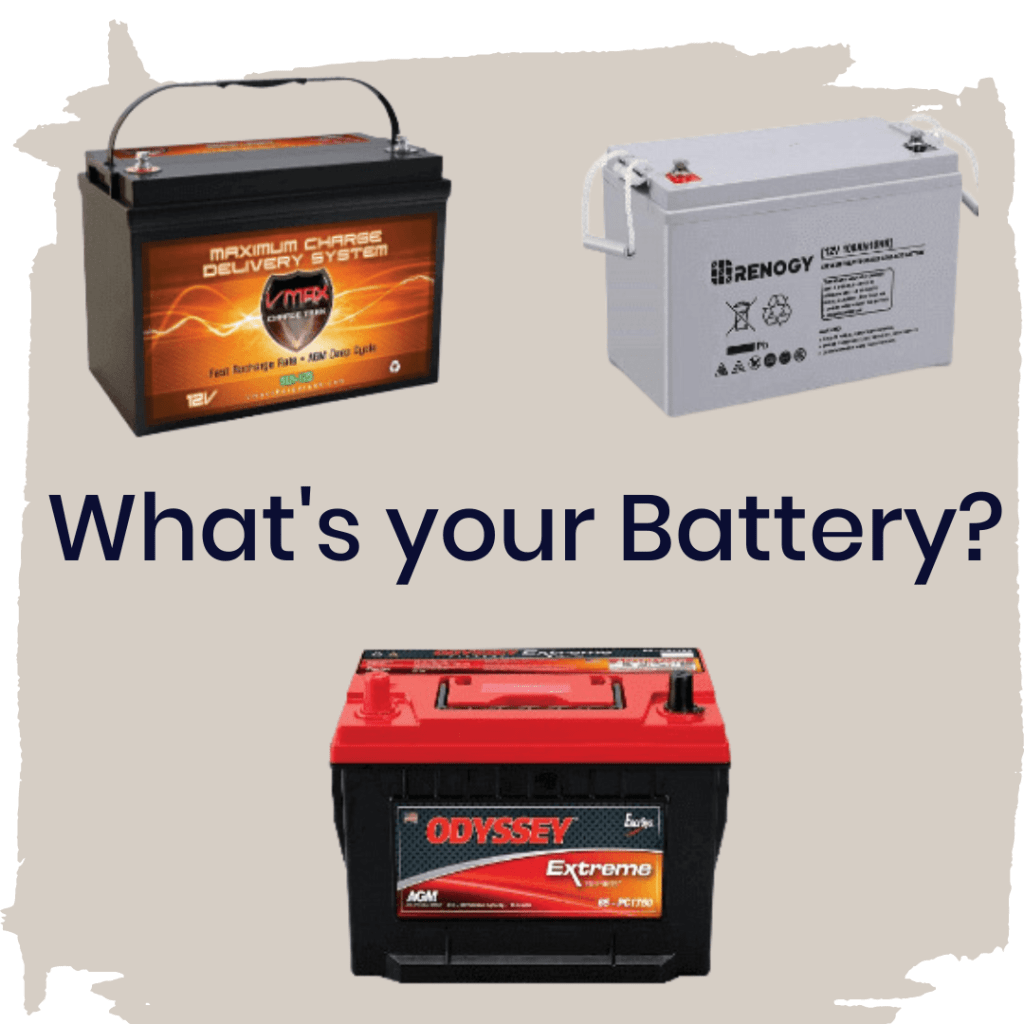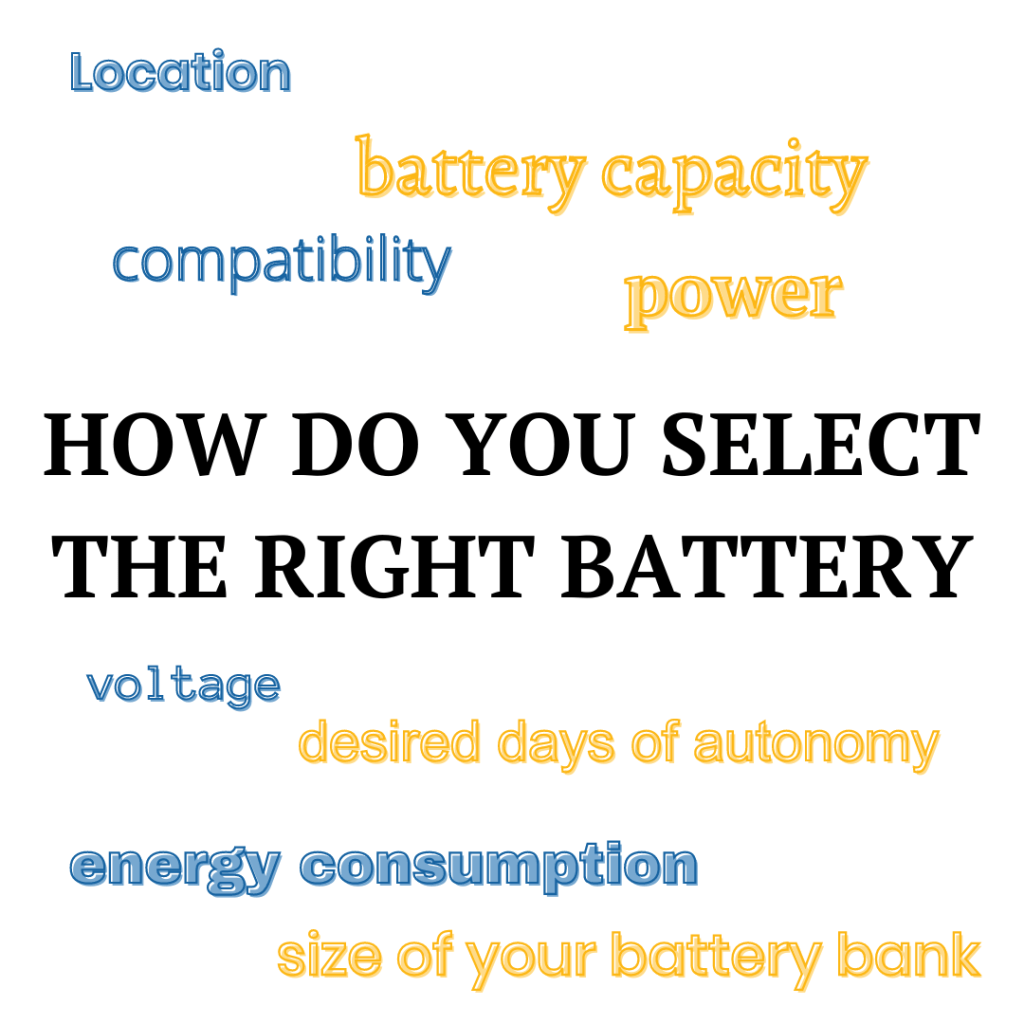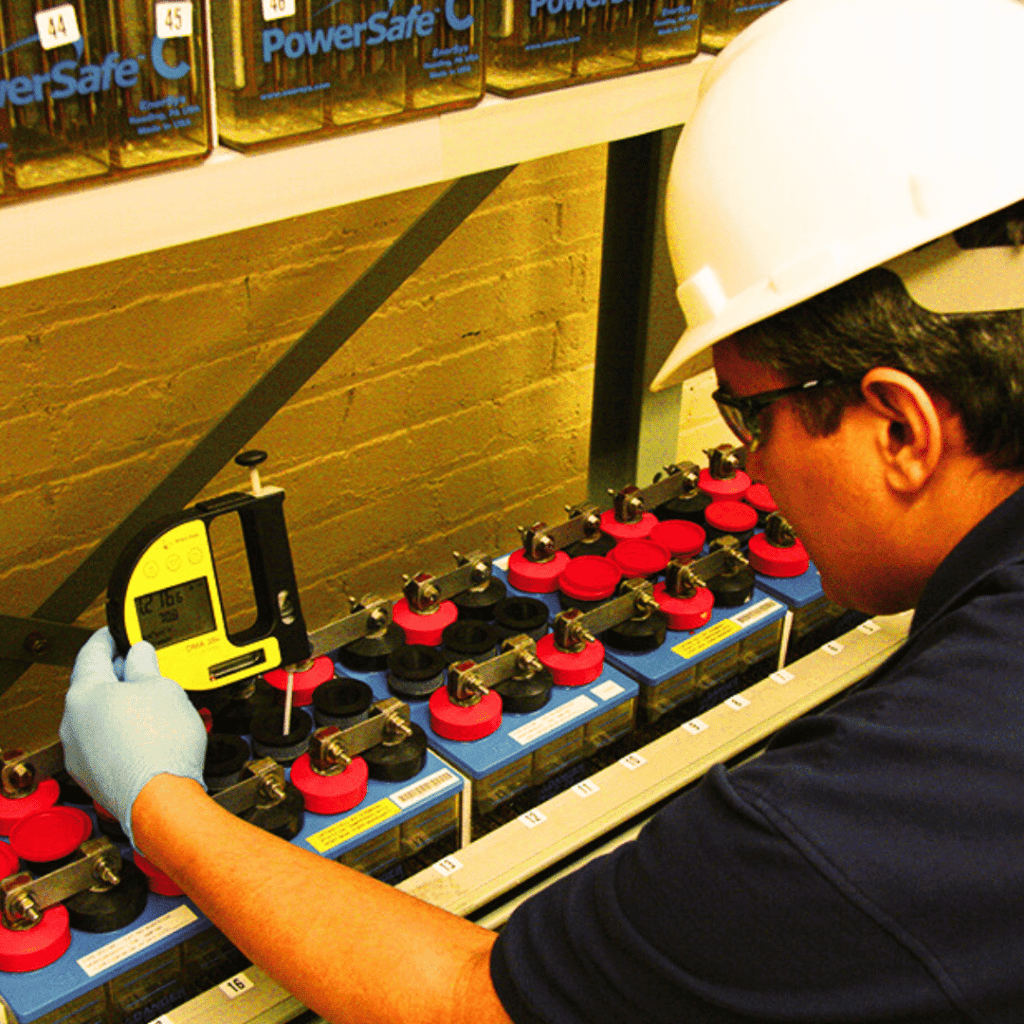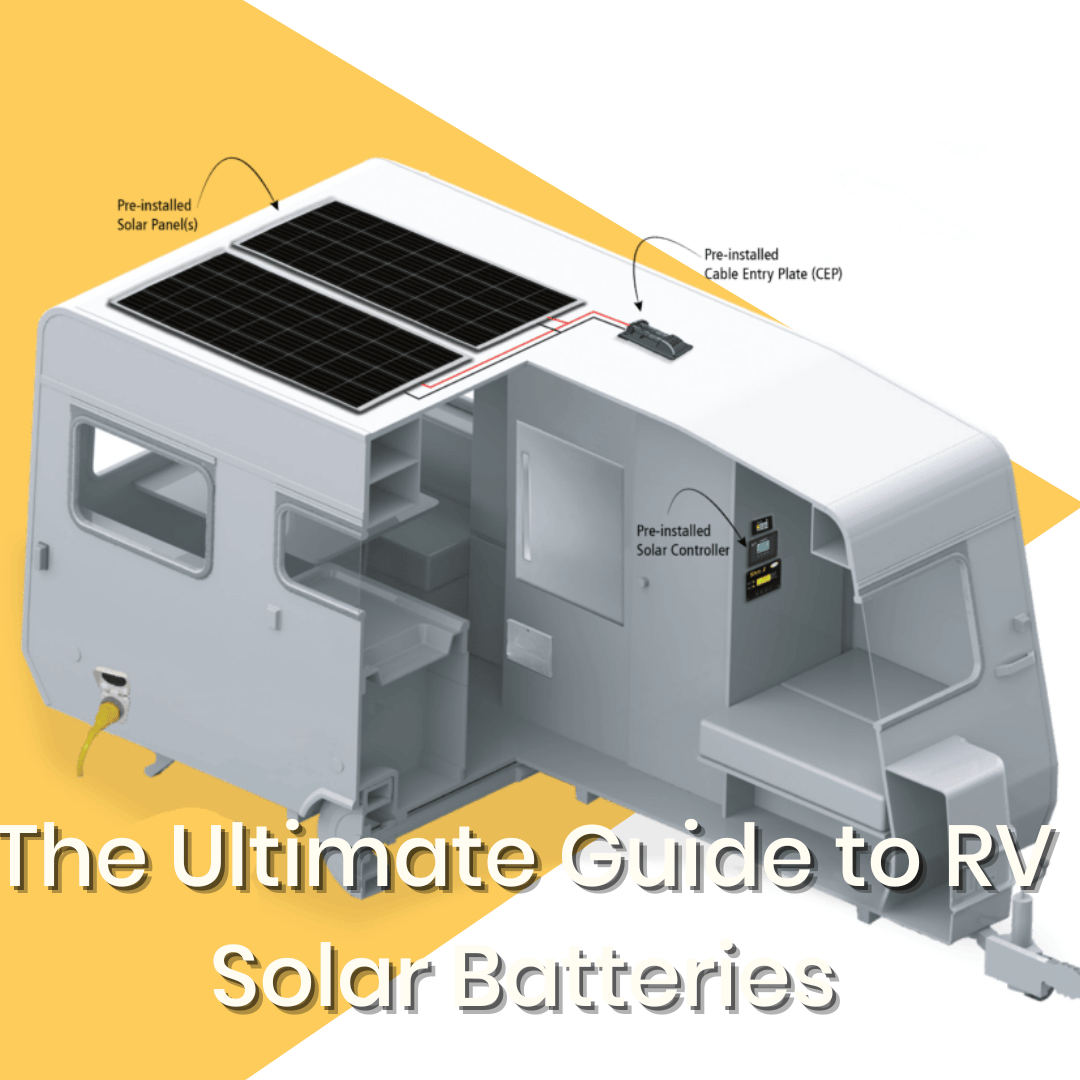Imagine the freedom to travel anywhere without worrying about finding a power source for your RV. RV Solar batteries can make that dream a reality, providing an off-grid solution to power your home on wheels. In this comprehensive guide, we’ll explore the different types of RV solar batteries, how to choose the right one for your needs and tips for maintaining and troubleshooting common battery issues. Get ready to harness the sun’s energy and unleash the full potential of your RV solar system!
Short Summary
- Understanding the differences between lead-acid, lithium, and AGM batteries is essential to choosing the best option for an RV solar system.
- Regular inspections and maintenance of RV solar batteries are necessary to ensure optimal functioning and prolong their lifespan.
- It is important to monitor battery life, power output, and charge retention to determine when upgrading your RV solar battery system is necessary.
Understanding RV Solar Batteries

RV solar batteries are a fundamental component of any mobile solar power system, enabling you to venture into areas without access to electrical power points. The various types of RV solar batteries include lead-acid, lithium, and AGM batteries, each with its advantages and disadvantages. Understanding the differences between these batteries is crucial for determining the best option for your RV solar system.
So let’s delve into the world of RV solar batteries and discover which type is the perfect fit for your energy needs.
Lead Acid Batteries
Lead-acid batteries have been around since 1857 and are a popular choice for many RV solar systems due to their affordability and wide usage. There are two types of lead-acid batteries: flooded lead-acid and sealed lead-acid batteries. Flooded lead-acid batteries are more prevalent and require regular maintenance, such as adding distilled water after repeated charges. On the other hand, sealed lead acid batteries, like the Weize 100 amp hour battery, are more economical and have a higher amp hour rating, meaning they can store almost twice as much charge as traditional lead acid RV batteries.
However, lead-acid batteries come with some downsides. They have a shorter lifespan of 2-3 years; each battery is 2-3 times heavier than lithium batteries. Despite these drawbacks, lead-acid batteries can be a viable option for those on a budget or for those who don’t require a large battery bank.
Lithium Batteries
Lithium-ion batteries are becoming increasingly popular for their many advantages over lead-acid batteries. They have a lifespan of 10+ years, are significantly lighter, and require minimal maintenance. Furthermore, lithium batteries can discharge almost 100% of their stored energy, providing more usable power for your RV.
The primary disadvantage of lithium batteries is their cost, as they are relatively expensive compared to lead-acid batteries. However, considering their longer lifespan, lighter weight, and ability to provide more energy, lithium-ion solar batteries can be an ideal choice for those who want to invest in a high-quality, long-lasting RV solar system.
AGM Batteries
Absorbed Glass Mat (AGM) and gel batteries are lead-acid batteries that use different separators to facilitate the movement of the electrolyte solution between the lead plates. AGM batteries use a fiberglass mat separator, while gel batteries utilize a silica gel. These sealed batteries do not spill or vent gas and require no maintenance, making them an attractive option for RV solar systems. Additionally, AGM batteries charge quickly and exhibit increased resistance to low temperatures.
While AGM batteries offer better performance than traditional lead-acid batteries, they still have a shorter lifespan than lithium batteries and may be more expensive than flooded lead-acid batteries. However, AGM batteries can be an excellent choice for those who want a low-maintenance battery that performs well in various conditions.
Choosing the Right Battery for Your RV Solar System

Selecting the correct battery for your RV solar system is crucial, as it determines how much power you’ll have available and how efficiently your system will function. Factors to consider when choosing a battery include battery capacity, voltage, and compatibility with your existing system.
It’s also essential to consider your energy consumption, desired days of autonomy, and the size of your battery bank. By carefully evaluating these factors, you can make an informed decision and choose the best battery for your RV solar system.
Battery Capacity
Battery capacity is critical in determining how much energy your RV solar system can store, as it directly impacts the amount of power you’ll have available for your appliances and devices. To calculate the required battery capacity for your system, consider your energy consumption and the number of days you want to be off-grid without recharging.
Considering these factors, you can select a battery with a suitable capacity to meet your needs and ensure you have sufficient power for your adventures.
Voltage and Compatibility
Voltage and compatibility are essential when choosing a battery for your RV solar system. The battery’s voltage must match the voltage of your existing system and be compatible with other components, such as the charge controller and inverter. Ensuring the proper voltage and compatibility guarantees a seamless integration of your chosen battery, helps prevent potential damage to your system, and maximizes its overall efficiency and performance.
By taking the time to research and select the correct battery for your RV solar system, you can save time and money.
Top 5 Batteries for RV Solar Kits for 2023
With so many battery options, deciding which is best for your RV solar system can be challenging. To help you make an informed decision, we’ve compiled a list of the top 5 RV solar batteries for 2023, including their features, benefits, and suitability for different RV solar systems.
These batteries have been selected based on their performance, durability, and user satisfaction, ensuring you’ll find the perfect battery for your needs. With this list, you can be sure you’re getting the best battery.
Ecoflow Delta Pro
Ecoflow Delta Pro is a high-capacity, portable power station with a 3600W AC output, which can be expanded up to 4500W with X-Boost technology. With a 3600Wh battery that can be expanded up to 25kWh, the Ecoflow Delta Pro is suitable for powering heavy-duty devices at home, outdoors, and even charging an RV and an entire house.
Multiple charging options, such as AC, DC, and solar, make it versatile for various applications. The long-lasting lithium battery and portability make the Ecoflow Delta Pro a top contender for RV solar kits in 2023.
Renogy Deep Cycle AGM Battery
The Renogy Deep Cycle AGM Battery is a reliable, low-maintenance option among deep cycle batteries that is perfect for RV solar systems and boondocking. With a long lifespan and maintenance-free operation, this deep-cycle battery is an excellent choice for those who want a hassle-free experience.
Its superior temperature range and cycle life compared to lead-acid batteries make it a more reliable option for an RV battery. If you’re looking for a dependable battery that can withstand the rigors of RV life, the Renogy Deep Cycle AGM Battery should be on your list.
BLUETTI Portable Power Station EB70S
The BLUETTI Portable Power Station EB70S is a compact, lightweight lithium battery solution with multiple charging options and a user-friendly interface. This power station features an 800W/1000W power inverter and a 716Wh LiFePO4 battery pack, making it suitable for camping or off-grid activities.
With a wireless charging pad and the ability to be recharged in just 3-4 hours from either solar panels or an AC source, the EB70S is a convenient and efficient power solution for RV solar kits in 2023.
Jackery Explorer 1000 Portable Power Station
The Jackery Explorer 1000 Portable Power Station provides a powerful lithium battery solution with a capacity of 1,002Wh and multiple charging options. Its durable design ensures that it can withstand the demands of life on the road, while its high power output makes it suitable for powering various appliances and devices.
If you’re looking for a versatile, high-capacity battery solution for your RV solar system, the Jackery Explorer 1000 Portable Power Station is an excellent choice.
Anker SOLIX F1200 Portable Power Station, PowerHouse 757
The Anker SOLIX F1200 Portable Power Station, PowerHouse 757, is a versatile power station with a high-capacity lithium battery and multiple charging options. With a battery capacity 1229Wh and a 1500-watt inverter, this power station can power 95% of home appliances, making it a great addition to your RV solar system.
Whether you need power for your appliances at home or on the road, the Anker SOLIX F1200 Portable Power Station, PowerHouse 757, is a reliable and efficient choice.
Installing and Connecting RV Solar Batteries
Proper installation and connection of your RV solar batteries are crucial for ensuring your system functions efficiently and safely. In addition to following the manufacturer’s instructions and safety precautions, it’s essential to understand proper wiring and configuration to guarantee optimal performance.
In this section, we’ll guide you through safely installing and connecting your RV solar batteries, helping you get the most out of your solar power system.
Safety Precautions
Safety should always be your top priority when installing and connecting RV solar batteries. Wear protective gear such as thick gloves and protective eyewear, and remove all metal items to prevent potential short circuits. Review any safety instructions included with your solar kit before beginning installation to ensure you’re following best practices.
By taking these safety precautions, you can protect yourself and your investment in your RV solar system.
Proper Wiring and Configuration
Ensuring proper wiring and configuration is essential for the efficient and safe functioning of your RV solar battery system. Make sure to use the recommended 6-4 AWG copper wire for connecting the batteries and follow the manufacturer’s guidelines for wiring and configuration.
Proper wiring and configuration will not only improve the performance of your system but also help prevent potential damage to the batteries and other components. By taking the time to wire and configure your RV solar batteries properly, you can enjoy the benefits of solar power with peace of mind.
Maintaining and Extending the Life of Your RV Solar Batteries
A well-maintained RV solar battery can provide you with years of reliable power, but neglecting its care can lead to premature failure and costly replacements. In this section, we’ll discuss tips for maintaining and extending the life of your RV solar batteries, including regular inspections, maintenance, and temperature control.
By following these practices, you can ensure your batteries remain in optimal condition and continue to power your adventures for years.
Regular Inspections and Maintenance

Regular inspections and maintenance on your RV solar batteries are essential to ensure their optimal functioning and extend their lifespan. Examine the battery’s voltage, temperature, and electrolyte levels during regular inspections, and address any signs of damage or wear and tear.
It is recommended to inspect your RV batteries every 90 days to catch potential issues early and keep them in prime condition. By staying vigilant and proactive, you can maximize the performance and longevity of your RV solar batteries.
Temperature Control
Temperature control plays a critical role in maintaining the performance and lifespan of your RV solar batteries, as extreme temperatures can negatively impact battery life. The ideal operating temperature for RV solar batteries is between 50°F and 85°F.
Installing a temperature control system in your RV can help monitor and regulate the temperature of your RV solar batteries, preventing exposure to extreme temperatures and ensuring they continue to function efficiently. Maintaining proper temperature control can protect your investment in your RV solar system and enjoy worry-free power for your adventures.
Troubleshooting Common RV Solar Battery Problems
You may still encounter issues with your RV solar batteries even with proper care and maintenance. In this section, we’ll discuss common RV solar battery problems and provide solutions for troubleshooting and resolving these issues, including batteries not holding a charge and problems with overcharging or undercharging.
By being prepared to handle these common issues, you can minimize downtime and keep your RV solar system running smoothly.
Battery Not Holding a Charge
If your RV solar battery is not holding a charge, there could be several potential causes, such as age, overcharging, sulfation, or a faulty charging system. To troubleshoot this issue, check the connections between the battery and the RV solar system, as well as the battery’s voltage.
Investigate any potential parasitic loads that may be draining the battery. Once the root cause of the problem has been identified, take the appropriate measures to rectify the situation, such as replacing the battery, servicing the charging system, or addressing other potential causes.
Overcharging or Undercharging
Overcharging or undercharging your RV solar battery can lead to premature battery failure and decreased performance. To prevent these issues, it’s essential to use a high-quality charge controller, such as the one from Victron Energy, in your RV solar setup.
A reliable charge controller and monitoring system can help you maintain the appropriate charging levels for your battery, ensuring its optimal performance and longevity. By investing in the right equipment and monitoring your battery’s charging levels, you can avoid overcharging or undercharging and keep your RV solar system running smoothly.
Upgrading Your RV Solar Battery System
As your energy needs change, you may find that your current RV solar battery system no longer meets your requirements. Upgrading your system can provide additional power, a greater energy density, a longer lifespan, a faster charging speed, or the ability to camp in more remote areas.
In this section, we’ll discuss when to upgrade your RV solar battery system and how to choose the right upgrade for your needs, ensuring that your system continues to evolve with you.
When to Upgrade
Knowing when to upgrade your RV solar battery system is essential for ensuring that you continue to have access to the power you need. Signs that it may be time to upgrade include a decrease in battery life, a reduction in power output, or difficulty in retaining a charge.
Additionally, if your current batteries are nearing the end of their lifespan or your energy needs have increased, it may also be an opportune time to consider an upgrade.
Choosing the Right Upgrade
When selecting an upgrade for your RV solar battery system, it’s essential to consider factors such as battery capacity, voltage, and compatibility with your existing system. By carefully evaluating these factors, you can choose the best upgrade for your system, whether replacing existing batteries with newer models, augmenting your current system with additional batteries, or upgrading to a more robust system.
With the right upgrade, your RV solar system will continue to meet your changing needs and provide you with the power you need for your adventures.
Summary
In conclusion, choosing the right RV solar battery system is crucial for ensuring that you have access to reliable, efficient power on the road. By understanding the different types of batteries available, selecting the right battery for your needs, and following proper installation and maintenance practices, you can maximize the performance and lifespan of your RV solar batteries. Whether you’re a seasoned RV enthusiast or just starting your journey into the world of solar power, this comprehensive guide has provided you with the knowledge and tools needed to harness the sun’s energy and confidently embark on your off-grid adventures.
Frequently Asked Questions
What batteries are best for solar panels on RV?
Lithium batteries are the best option for solar panels on an RV, as they charge quickly and help prevent battery damage due to over-discharge.
They are also lightweight and easy to install, making them ideal for RV owners who want to maximize their solar energy efficiency.
How many batteries do I need for my RV solar system?
Based on the most common advice, you need 600 watts of solar panel power for a 200-250 AH RV battery capacity.
What is the life of solar battery in RV?
Lithium-ion batteries are the most common choice for RV solar systems and have a typical lifespan of 5 to 15 years with proper care and maintenance.
Lead-acid batteries usually last 2-3 years, while lithium deep-cycle marine trolling motor batteries have an 8-12 year warranty lifespan.
Are AGM batteries good for RV solar?
AGM batteries are an ideal choice for RV solar systems due to their excellent performance, long lifespan, sealed design, and ability to handle high charge and discharge rates without damage.
They are also more resistant to vibration and shock than other types of batteries, making them an excellent choice for RV applications. AGM batteries are also maintenance-free, requiring no regular maintenance or topping up of electrolytes. This makes them a great team.
Can I mix different types of batteries in my RV solar system?
Mixing different types of batteries in an RV solar system is not recommended, as this can lead to imbalanced charging and reduced performance.
Mixing different types of batteries can cause problems such as overcharging, undercharging, and reduced performance. This can lead to a decrease in the lifespan of the batteries and can even cause them to fail prematurely.






